| Srl | Item |
| 1 |
ID:
147840
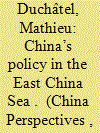

|
|
|
|
|
| Summary/Abstract |
This paper looks back at China’s policy towards the establishment of a crisis management mechanism with Japan in the East China Sea from the beginning of the negotiations in 2008 to the deadlock reached at the end of 2015. During this period of seven years, China moved from being a reluctant negotiator to interrupting the negotiations and finally accepting their resumption, but only after setting such a high bar in terms of relative sovereignty gains that the talks unravelled. The paper argues that the socialisation of China to confidence-building norms in the security sphere – norms that the strategic community of the PRC traditionally rejects – is making very slow progress despite the rising risk of incidents in maritime East Asia. It concludes that Chinese foreign policy uses crisis management negotiations to secure a variety of foreign policy goals linked to sovereignty and balance of power rather than a tool purely dedicated to building security and stability by freezing an existing status quo.
|
|
|
|
|
|
|
|
|
|
|
|
|
|
|
|
| 2 |
ID:
144842


|
|
|
|
|
| Summary/Abstract |
This paper draws on extensive island examples with a view to offer ‘creative’ solutions to the ongoing dispute over the Diaoyu/Diaoyutai/ Senkaku Islands between China (and Taiwan) and Japan in the East China Sea. In spite of the rhetoric and apparent intractability of island conflicts, there are various examples from the past (and the present) that suggest how island disputes may be decided, and in ‘win–win’ ways, to the satisfaction of the different parties involved. The resolution of island territorial problems can benefit greatly from a critical appreciation of how other small islands, also contested, have had their situation resolved in non-zero-sum ways. In such cases, sovereignty has been shared, split/divided or expunged; in other cases, sovereignty disputes have been put aside in order to co-develop and co-exploit natural resources. There is also one example of a UNESCO World Heritage Site consisting of a string of small islands and surrounding waters whose management is shared between three countries.
|
|
|
|
|
|
|
|
|
|
|
|
|
|
|
|
| 3 |
ID:
137769
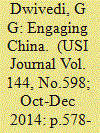

|
|
|
| 4 |
ID:
131258
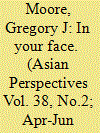

|
|
|
|
|
| Publication |
2014.
|
| Summary/Abstract |
While China's rising power is certainly an important variable in Sino-Japanese relations, it cannot explain either why the Diaoyu/Senkaku Islands dispute broke out anew in the fall of 2012 or why the Chinese response was so strong. China read Japan's move to nationalize the islands as an in-your-face move designed to show disrespect for China and make Japan's sovereignty over the islands a fait accompli. In this article I borrow from Robert Putnam's notion of twolevel games to argue that there are two levels of face politics going on in this case: one between domestic actors in Japan and in China, the other between the two countries. A solution to the territorial dispute can only be found when both sides' "face needs" are recognized and met at both levels of analysis.
|
|
|
|
|
|
|
|
|
|
|
|
|
|
|
|
| 5 |
ID:
100239
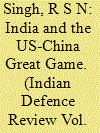

|
|
|
| 6 |
ID:
114065
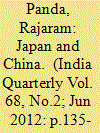

|
|
|
|
|
| Publication |
2012.
|
| Summary/Abstract |
Sino-Japanese relationship is too complex a narrative in the study of security and strategic dynamics of East Asia. Despite historical irritants both have developed such a close economic relationship that neither can afford to derail the partnership by any act of miscalculation. Though neither perceives the relationship in zero-sum-game terms, both realize the benefits that would accrue if it is deepened, nothwithstanding the element of fragility in the relationship. More recently, China's military modernisation and rising assertiveness in territorial issues have raised anxiety in Japan. Similarly, China does not see kindly to Japan's Defense Guidelines that mentions China as a matter of 'concern'. The contending claims over the Senkaku Islands are a sore point in the relationship and a solution does not seem to be in the horizon. This article attempts to analyse the intricacies in the bilateral relationship in the context of changing security dynamics in the Asia Pacific region and in the wake of economic interdependence and the desire to foster economic integration of economies. China is a big challenge for Japan. Managing China through regional institutions such as East Asia summit and ADMM Plus are the desirable options. The extended presence of the US as a stabilising force is likely to stay despite talks of US 'decline'.
|
|
|
|
|
|
|
|
|
|
|
|
|
|
|
|
| 7 |
ID:
131657
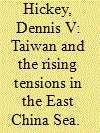

|
|
|
|
|
| Publication |
2014.
|
| Summary/Abstract |
This study examines Taiwan's policy toward the territorial dispute in the East China Sea and explains why it has yielded some dividends. The paper suggests that Taipei's diplomatic initiative-the East China Sea Peace Initiative-is the most sensible proposal advanced to reduce the potential for conflict in the region.
|
|
|
|
|
|
|
|
|
|
|
|
|
|
|
|